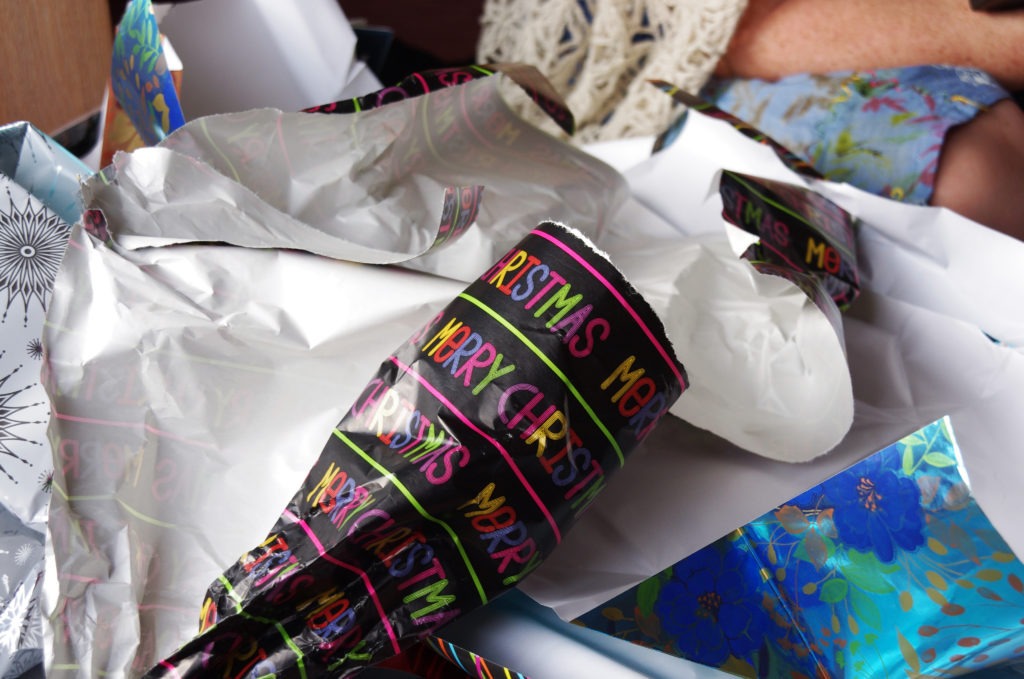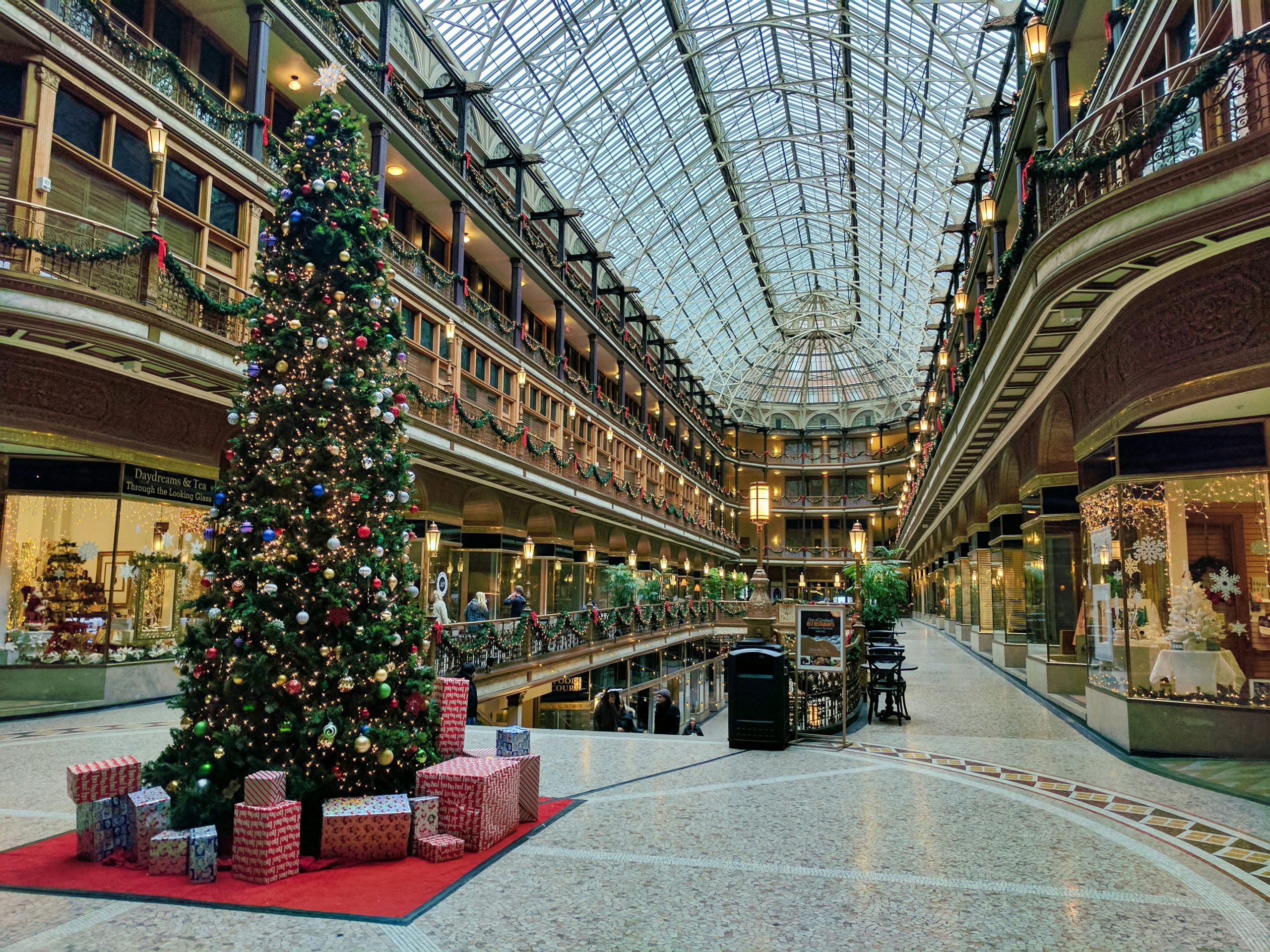Christmas lights strung up, holiday-themed merch hogging department store shelves, coffee shops offering peppermint-flavoured drinks — it is the telltale sign of the quickly approaching holiday season. Considering all the material changes we associate with Christmas, it’s time to stop and ask ourselves: are we just celebrating consumption?
The latest national survey by Deloitte reveals that Canadians are planning to spend 10 per cent more this holiday season compared to last year, with an expected $1,478 in expenditures per household. While holiday spending has steadily declined in the past two years due to economic hardships, the expected increase in spending this year isn’t actually due to Canadians’ renewed optimistic view for the economy; it’s simply the result of inflation having driven up the costs of retail goods.
The pressures from this economic increase seem to be shared by the York population; in a survey answered by 22 respondents, over a third of students (36.4 per cent) answered that they expected to spend at least $100 on holiday shopping this year. However, this level of spending and consumerism is really a “double-edged sword,” according to Dr. Esther Greenglass, professor of psychology, activist, and distinguished author at York’s Faculty of Health.
“Strictly, from an economic perspective, Christmas is very lucrative and very important for businesses in the West,” shares Greenglass.
Her sentiments are mirrored by the trends that national surveys have predicted for this holiday season. Despite the popularity of eCommerce platforms, malls and shopping centres are still the preferred destination for holiday shopping, which is promising news for the Canadian economy.
“A lot of businesses hire part-time workers during [the holiday season], many of [whom are] students,” Greenglass explains, highlighting the positive impact of holiday spending, which she believes to be healthy for “generating jobs” and “boosting the economy.”
Defining Christmas within the sociocultural context of Toronto
Considering the economy begs an important question: what has Christmas become? There are different ways to look at the holiday, and “while the meaning of Christmas is very different from what it was originally, it has evolved within the context of our societal values,” Greenglass explains.
Associate Professor of Marketing Ela Veresiu, teaching at the Schulich School of Business, believes that “Christmas has evolved into an increasingly secular or nonreligious holiday marked by gift giving, excessive shopping, [and] social gatherings.”
According to Veresiu, “consumer culture plays a pivotal role in shaping how we celebrate” the holiday. Her point is supported by responses from York students, with over half (54.5 per cent) of the respondents feeling pressured to give material gifts during the holidays, and 68.2 per cent buying Christmas presents this year.
However, Greenglass believes that the “social context” of Toronto has to be taken into consideration as well. “Christmas is no longer a religious holiday; it’s a social celebration,” Greenglass notes. “Toronto is very multicultural, with many different religions, cultures, and languages,” she adds, and while Christmas may not be celebrated in a religious context by all, it is “one of the things that brings us together as a society,” in that people who were not “raised with Christmas [can] still enjoy it, celebrate it, and get into the spirit.”
Christmas gifts: Consumption vs care
According to Veresiu, if one “focus around Christmas is on consumption as a form of celebration,” the flip side is that the giving of gifts has, historically and culturally, been seen as a genuine expression of care towards the recipient. Indigenous potlatches were quite literally a “giving feast,” as the etymology of the term potlatch stems from the Chinook term for “gift.” As Greenglass explains, “There’s a certain joy in giving gifts — not necessarily expensive gifts, but just the idea that at Christmas, people remember what you’ve done for them,” such that the gift becomes “a token of their appreciation [and] friendship.”
Interestingly, however, is that only half of survey respondents expressed that they would never regift a present received during the holidays.
Furthermore, out of 22 students, 21 indicated that they would prefer to receive experiential and monetary gifts instead of material gifts, with 59.1 per cent favouring the experiential gifts, such as concert tickets or participating in a group activity.
Perhaps this is unsurprising, as the nature of material gifts can be hit or miss. But one thing is clear: intent, thoughtfulness, and sentiment are what set apart a good present that won’t simply be discarded, regifted, or forgotten.
“I always try to think about gifts in terms of what people need, what they will use,” says Natalia Sadowski, a fourth-year creative writing student. “Buying a gift for the sake of buying an object and giving it to someone defeats the whole point on a sentimental level, and it’s just a waste of money.”
Aqib Chaudhry, also a fourth-year creative writing major, shares similar thoughts: “I’ve always aimed for a sensible balance in gift-giving; of the sentimental, and the material. I often try to dedicate most of my focus towards the personal nature of a gift, then consider the ‘material aspect.’”

Regrounding Christmas through community, connection, and compassion
A study on happiness in the holiday season supports this point, with researchers concluding that communal, familial, and spiritual activities were better indicators of satisfaction during Christmas celebrations. Prioritizing rituals and traditions during the holidays not only strengthens social bonds, but also helps with developing and finding one’s own identity through social values. This is not to be misconstrued for banning gifts altogether, but rather shifting the focus to the creation of experiential memories that are aimed at bringing about acceptance and love.
Camron Welsman, a fourth-year student majoring in creative writing, shares some of the traditions and rituals he engages in with his family: “Keep family gatherings simple. Send your friends cheap, corny Christmas cards. Be sure to watch the Christmas classics in ugly but comfortable pyjamas.”
The creation of rituals and traditions with family and friends matters now more than ever. “Contrary to what people may think, after COVID, they simply haven’t bounced back,” shares Greenglass, whose latest research focuses on the social determinants of health following the pandemic. “Being socially isolated was psychologically distressing for many individuals.
“There’s more of a wish to be physically close to others […] I think one of the things we seriously need to consider is that people are reacting to Christmas now after a long drought,” she explains.
This sentiment seems to be shared by the majority of Canadians; national surveys report that from the holiday budget, spending on experiential activities — recreation and dining —- is expected to take up 36 per cent of their budget — up 6 per cent from last year — which also comprises a 20 per cent increase on travel spending.
The impetus behind this surge in experiential monetary allocation may be explained by Greenglass: “The idea of reconnecting, either with family, loved ones, or significant others, can sometimes provide a grounding that people need.”
Sadowski agrees, finding that one meaningful way to celebrate Christmas is to simply get together and enjoy each other’s company. “Just plan a glorified hangout. Maybe everyone contributes in a way they are able to. For example, one friend brings the board games, one friend makes guacamole, the host has the chips. Little things like that can honestly go a long way to making the holiday a fun time,” she suggests.
Saving the Christmas trees: Environment and celebration
The same study on holiday satisfaction also found that consumers who engaged in environmentally-friendly consumption practices tended to be happier. Veresiu succinctly summarizes why this might be: “Scientists and scholars studying the link between consumer overconsumption and societal problems, such as income inequality and environmental degradation, agree that overconsumption, fueled by relentless economic growth and the individual desire for material goods, is a prominent driver of such societal problems.”
According to Zero Waste Canada, the holiday season can cause more than a 25 per cent increase in household waste. Furthermore, Canadians alone are responsible for using six million rolls of tape annually for wrapping Christmas presents. Gift-wrapping and shopping bags on their own account for 545,000 tons of waste in Canada.
And this does not even include the carbon emissions and waste generated from online shopping. Forty-three per cent of Canadians’ holiday budget seems to be allocated towards online purchases from eCommerce platforms, the majority of which gained popularity through social media during the pandemic.
“Companies design their holiday marketing campaigns to capitalize on the warm feelings, family togetherness, and gift-giving associated with Christmas,” Veresiu cautions. “Companies benefit from this strategy because it tends to enhance brand recall and loyalty, while ultimately increasing sales during the holiday period.”
Millennials and Gen Z in particular, who are the biggest savers among consumers, are the most likely to gravitate towards retail giants that have “monopolized the global economy,” such as Amazon, Temu, Shein, and Walmart for their purchases.
The competition these retailers have with each other is predicted to have catastrophic consequences by 2030. What Amazon started with same-day deliveries and same-day returns is now the norm for not just eCommerce platforms, but most stores and shopping centres as well. This has caused the global supply chain to nearly reach a breaking point, as shipping companies are struggling to keep up with global delivery demands. And while we can certainly shift some of the blame to the big corporations driving this excessive overconsumption, we also need to hold a mirror up to ourselves.
The crisis of the global supply chain aside, the environmental impact of such a high demand is terrifying. By 2030, only in six years’ time, it is estimated that 7.2 million delivery vehicles will be dispatched, increasing CO2 emissions by six million tons. The actual packaging that comes with each product is also a massive cause for concern: the production of 241 million tons of shipping cartons requires three billion trees to be pulped each year. And in terms of plastic waste? Barely any of it is recyclable, a mere 14 per cent of plastic packaging from the 86 million tons being repurposed or recycled in some way annually.

The future of Christmas: Caring for each other and the environment
If you’re feeling overwhelmed, fear not. There is a silver lining to the global crises we are facing; we simply have to get more creative with our gift-giving this holiday season. Convenience isn’t always better, especially for the environment, and if you are giving gifts to people you truly care about, wouldn’t you want to take the extra effort to convey your sentiments?
Veresiu suggests a unique trend that is environmentally conscious and fun: “One of the top consumer trends that I am happy to observe, which both challenges and helps reduce the overconsumption we typically encounter during Christmas, is gifting thoughtfully curated thrifted or second-hand finds, typically in nicely organized, equally thrifted baskets.” This trend, as Veresiu explains, is gaining popularity on social media, with users having #thriftedgifts, #thriftmas, and #thriftedandgifted on their posts to popularize the trend.
Sadowski shares that “heartfelt letters expressing why someone is important to you” is one of the most meaningful gifts you can give. Chaudhry agrees, adding that thinking up “ways in which you can give someone your time — whether that be through shared experiences or crafts — is something that is an incredibly underrated gift.”
Max, a second-year psychology and linguistics double major, shares their insights on conscious and intentional gift giving: “I’m a fan of cooking or baking for my more extended family members […] the only thing you buy are reusable pretty jars or tins. I’ve made it something of a tradition.” They also emphasize the importance of giving handmade gifts, as “the result is a minimally wasteful but inherently heartfelt and valuable gift.”
Lastly, Veresiu shares that “gifting donations to a favourite charity or non-for-profit organization in the name of the gift recipient” is a thoughtful and heartfelt gesture. Perhaps it is unsurprising to learn that charitable donations are expected to go up by 35 per cent this holiday season. “People tend to be more generous at Christmas because they feel lucky […] it generates a certain goodwill towards other people,” Greenglass shares. “It’s a time of giving back.”



